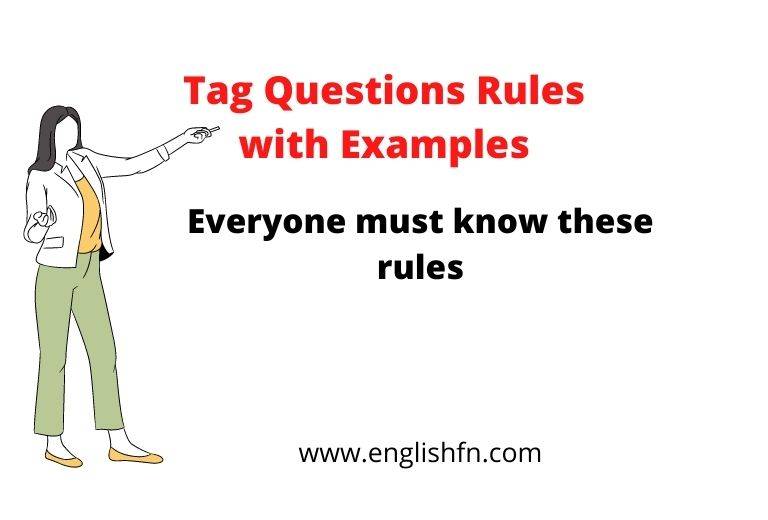What is Tag question?
Tag questions are those questions which are added to the end of a sentence or a statement to draw attention to it. Tag question added a force to the statement.
For example:
- They will come soon, won’t thy?
- She did not come in time, did she?
– This statements draw a special kind of attention to the question. This type of questions are called tag question. Read the full article to know the important rules how to make correct tag question. Also read: Tag Questions Exercises(MCQ)
Rules of question tag
It is very important that the student must know the important point to avoid any mistake when they make question tag. The chief points to remember when use question tag are mention below-
Rules No:1. First point to remember is that a positive statement takes a negative tag, and a negative statement takes a positive tag.
For example-
- It is very cold today, isn’t it?
- It is not very worm today, is it?
These two sentences, if you notice the positive statement takes negative tag and a negative statement takes positive tag. “It is very cold today” this statement is a positive so the tag is added as negative “isn’t it”. Similarly the in the next statement.
| Note: if the question tag is negative, the tag is added in negative contracted form “n’t” has- hasn’t , did- didn’t etc. |
2. Some of the positive verb with negative meaning or idea takes a positive tag. For example- ‘none of‘. Some positive statements with a negative subject, complements or a negative adverb that modifies the verb, needs a positive tag. So while using questions tag one should be very careful.
- None of the food was wasted, was it?
- We saw no-one we knew did we?
Here, the two statements though seems to be positive but the idea is negative so the positive tag “was it?” and “did we?” used.
- Remember when semi-negative words are used in a statement it take positive tag. Little, few, hardly, scarcely, rarely, seldom, these words are treated as negative in question tag so it takes positive tag. For example-
- Few people knew the question, did they?
- We seldom see them nowadays, do we? Etc.
| Remember: though few little are considered as negative but statements containing a few, a little takes negative tag. |
3. When a statement with a few or a little it takes negative tag here are some examples- A few people knew the question, didn’t they? Its takes a negative tag “didn’t they?”
- The adverb “only” may take positive as well as negative tag. Both are correct in English grammar; however a positive tag is more formal than negative one. When you say- “there were only 10 students present in the classroom, were they?”
We can also say that- there are only ten students present, weren’t they? Both the statement is appropriate but the first one with positive tag is more formal.
Tag questions
Rules No 4. When the subject of a statement is “I” pronoun the question tag takes verb “are or aren’t” and we do not use am or amn’t. see the example below-
- I am older than you, aren’t I?
- I am your friend, aren’t I?
In the above sentences I am your frient, amn’t I? Is incorrect in the same way the second sentence as well we can not use tag “amn’t I?
5.When the statement is imperative sentence, and refers to a simple request then the question tag usually takes ‘will you?’ but when the statement indicates some kid of emergency or urgency or mandatory it takes won’t. for example-
- Have another cup of coffee, will you?
- Be careful when you cross the road, won’t you?
5.When a statement refers insulting kind of rebuke then use “can’t ‘tag . When you say – Use your common sense, can’t you?
6.When a statement starts with let or sentences with let like –let’s go, lets him come inside etc. simply takes “shall we” in question tag.
For examples-
- Let’s have a game of chess, shall we?
- Let’s go, shall we?
- Some of you statements takes you in tag. For example. Some of you learning English, aren’t you?
